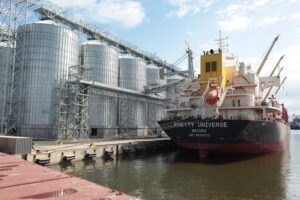
New dry cargo ships carrying agricultural products are entering Ukrainian ports, which has resulted in a 30-40% drop in sea freight rates over the past 2-3 weeks, Minister of Agrarian Policy and Trade Mykola Solsky said on the air of the United News marathon.
“New ships are coming. We express our gratitude to the military and the country’s leadership, who have done and are doing a lot to keep everything going (agricultural goods were exported by the Black Sea – IF-U). In principle, every farmer will soon be able to feel that logistics should become cheaper thanks to this route and, accordingly, the price of grain (profitability – IF-U) for the farmer will increase,” he said.
Mr. Solsky noted that a week and a half ago, small ships entered Ukrainian ports. The first one, he recalled, carried 4 thousand tons of grain. The ships that are now calling at the ports are 10 times larger in tonnage.
“This indicates that the market has cautiously but already begun to trust this corridor and the Ukrainian military, which made the operation of this channel (for exporting Ukrainian agricultural products – IF-U) possible,” the minister emphasized.
According to him, the arrival of ships to Ukrainian ports on the Black Sea, in particular to Odesa, Chornomorsk and Pivdennyi, resulted in a decrease in freight prices “literally in two weeks when these first ships left the ports.”
“The first ones have left. It (freight – IF-U) was expensive. The next ones are cheaper. I think the freight has fallen by about 30-40% in 2-3 weeks. It’s still expensive, but it’s much cheaper than standing idle,” Solsky said and added that the first proposals for insurance of agricultural cargo transportation by sea have already appeared.
The Minister expressed hope that the cost of maritime logistics will continue to decline. He called for patience and trust in the work of the military and all the specialists involved in reopening the Black Sea.

Problems with logistics and electricity in the export of agricultural products from Ukraine during the war make it unprofitable to grow crops, so in 2023, the total yield in the country will reduce three times compared to the record prewar level – to 40 million tons from almost 120 million tons.
Reducing the harvest to such low levels is already inevitable due to the current economic situation in the country, but by financing the agricultural sector, Ukraine can achieve by 2024 to increase the harvest up to 70 million tons, said the owner of the grain trading holding Prometheus Rafael Goroyan in an interview with Interfax-Ukraine agency.
“Last year we harvested 120 million tons of grain and oilseeds, this year we have already fallen to 60 million tons, and next year, according to my forecast, there will be 40 million tons, that is a fall of 300%! At the same time, the entire infrastructure of Ukraine is sharpened under the harvest of 120 million tons or even more, is what we have achieved for 30 years of independence. The entire infrastructure is designed for 120 million tons – cars, wagons, stations, ports, elevators – and there will be no goods!”, – stressed the head of Prometheus in an interview.
“There will be a very sharp shortage of wheat, barley and corn. Sunflower and soybeans will be enough, these are high-margin crops, and corn will not be sown. Now it is expensive to dry it, this year’s crop cannot be harvested, cannot be exported – and then, when we win the war (and I think this will happen very soon), the ports will open, the light will appear, and we will have a shortage of products,” he added.
According to Goroyan, a reduction in the grain harvest will lead to a collapse in the value of infrastructure assets in Ukraine, such as ports, elevators and vehicles, as well as a sharp increase in world prices of wheat, corn and barley. In this sense, the reduction of the wheat harvest is especially serious because it is a “politicized” crop, linked to global food security, the shortage of which will lead to an increase in its quotations on major world exchanges.
Thus the government has to urgently begin issuing state-guaranteed loans to agrarians in order to prevent stagnation in gross harvest for several years after 2023. This will allow Ukraine, by investing relatively small funds, to avoid a reduction in the harvest and the associated decline of the farming and grain trading industries, as well as the bankruptcy of logistics and infrastructure companies.
“We need to do this so we don’t see a sharp drop in exports in two years, and we’re likely to see one. Then there will be no agribusiness in the country, the country will be without currency, we will face serious unemployment, big inflation and all things will go wrong. I believe that we need urgent subsidies from the state to the agricultural producer, very urgently, literally for yesterday. And this should be done in light, without complicated formalities, because the average and small Ukrainian farmer does not like to formalize anything”, – said Goroyan during the conversation.
As it was reported, Ukrainian agrarians harvested 71.72 million tons of major crops from the total area of 17.05 million hectares by December 23. This figure is given including sugar beet, which was harvested 9 million tons from 179 thousand hectares.
The final yield of wheat in this season amounted to 19.4 million tons from 4.7 million hectares, barley – 5.6 million tons from 1.6 million hectares, rape – 3.2 million tons from 1.1 million hectares, pea – 261 tons from 115 thousand ha. In addition, on December 23, a total of 20.2 million tons of corn from 3.1 million hectares (+0.2 million ha), 10.1 million tons of sunflower from 4.6 million ha, 3.7 million tons of soybeans from 1.5 million ha, 157 tons of buckwheat from 115 thousand ha and about 100 tons of millet from 43.5 thousand ha were collected.
Ukraine in 2021 collected a record harvest of cereals, legumes and oilseeds at 106 million tons: 84 million tons of cereals and legumes and 22.6 million tons of oilseeds.
A total of 32.4 million tons of wheat, 40 million tons of corn, 10 million tons of barley, 581.5 thousand tons of peas, 191 thousand tons of millet and 110 tons of buckwheat were harvested last year. Sunflower harvest amounted to 16.3 million tons, soybeans – 3.4 million tons and rapeseed – 2.9 million tons.